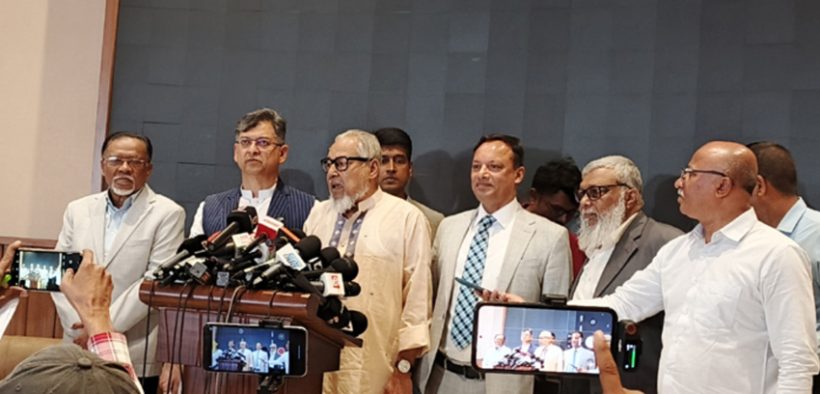BNP rejects proposal to split party chief, PM roles

BNP Standing Committee Member Salahuddin Ahmed addressed the issue during a break from a crucial meeting held between the party and the consensus commission on Sunday at 11 AM. Speaking to journalists at around 2 PM during the lunch recess, Ahmed clarified the party’s position, stating that while the BNP supports a limitation of two consecutive terms for a prime minister, they are in favor of allowing the same individual to return to the position after a break—if the people and the party choose so.
The reform commission had proposed that the roles of head of government, party leader, and parliamentary leader should not be held by the same person. BNP, however, does not agree with this stance. Ahmed argued that in many democratic countries, including the United Kingdom, it is common practice for the party chief to also be the head of government, and such a model is consistent with democratic norms.
He further added that BNP believes in reinstating the caretaker government system to ensure free and fair elections through an independent election commission. According to Ahmed, if a fair election is held under such a system and the people choose a leader, that choice should be honored without restrictions on leadership roles.
Ahmed also mentioned that BNP has proposed the repeal of the Fifteenth Amendment of the Constitution, aiming to restore the country’s constitutional framework to its earlier state. He claimed that the current constitution lacks provisions for secularism and pluralism. However, BNP has expressed agreement with the commission’s proposal to incorporate principles from the country’s Declaration of Independence—namely equality, human dignity, and social justice.
On another note, Ahmed stated that BNP supports, in principle, the inclusion of internet access as a fundamental right in the Constitution. However, he cautioned that the implementation of such rights must take into account the economic capacity of the state. “It is the responsibility of the state to ensure the fundamental rights of the people, but constitutional provisions should also be realistic and within the state’s ability to implement,” he said.
BNP Standing Committee Member Nazrul Islam Khan echoed similar sentiments, stating that while there is growing understanding between the BNP and the commission on several constitutional matters, disagreements remain on certain issues. He emphasized that in a democracy, it is normal to have both agreement and disagreement. “We do not believe in systems like BAKSAL, where everyone is forced to agree,” Khan remarked.
He concluded by stating that any constitutional reform should be guided by what is rational and beneficial for the country and its people. “Whatever is just and good for the nation and its citizens should prevail,” he affirmed.











